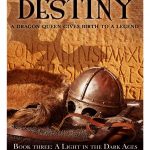An Author’s Mind – posted on March 22nd 2018

This month, I’m delighted to welcome British independent author, Tim Walker. Welcome to the An Author’s Mind slot, Tim. We’re looking forward to hearing about your recently published novel and any works in progress. So many of us love Arthurian legend!
Thanks for inviting me. My new historical novel, published in March 2018, is Uther’s Destiny. Although the third book in A Light in the Dark Ages series, it can be read as a standalone, as it charts the imagined kingship of High King Uther Pendragon of the Britons in the second half of the Fifth Century. He is perhaps better known as the father of King Arthur.
Can you briefly describe the story of ‘Uther’s Destiny’?
The story begins two years into Uther’s reign in the year 469 AD. He has succeeded his brother, Ambrosius Aurelianus, as high king of the Britons, and his main concern is to protect the boundaries of his kingdom – modern day England and Wales – from barbarian invaders. Uther’s destiny as a warrior-king seems set until his world is turned on its head when his desire to possess the beautiful wife of a noble, Ygerne, leads to conflict. Brittle alliances teeter on the brink of collapse as Uther doggedly pursues his quarry, oblivious to other pressing matters of state.
Court healer, and schemer, Merlyn, sees an opportunity in Uther’s lustful obsession to fulfill the prophetic visions that guide him. He is encouraged on his mission by druids who wish for a return to ancient ways and urge him on to protect the one destined to save the Britons from invaders and lead them to a time of peace and prosperity. Merlyn must use his wisdom and guile to thwart the machinations of an enemy intent on foiling his plans.
Uther is challenged to rise above his domestic problems and raise an army to oppose a gathering Saxon force. In a climactic moment, the two armies meet in a battle that will decide the fate of the island.

What was your inspiration for writing this book series?
On a summer’s day in 2015 I stood on a grassy meadow at the site of former Roman town Calleva Atrebatum (known as Silchester in the Middle Ages) in North Hampshire, trying to imagine what it would have been like at the time the Romans evacuated between 409-410 AD. Unlike other Roman towns, this one was largely abandoned some time after the Romans left, and therefore is a green field site for archaeological excavation. The abandonment took place gradually over a few hundred years, for reasons that are the subject of speculation.
It was the site of the main village of the Atrebates tribe at the time of the Roman occupation that took place after 49 AD, when the legions of General Aulus Paulinius (on behalf of the Emperor Claudius) worked their way across the island. The Atrebates were subdued and became a ‘client kingdom’ in the same way as the Trinovantes and Iceni had to the east. The stone-walled town the Romans built was named ‘Calleva Atrebatum’ meaning ‘Wooded Place of the Atrebates’ – showing a desire by the Romans at conciliation and aimed at getting the cooperation of their new subjects.
I had read Rosemary Sutcliffe’s novel The Eagle of the Ninth at school, and was intrigued to learn that the discovery of a bronze eagle (on display in the Reading Museum) buried in what would later be identified as the Forum in Calleva, was her inspiration. I was also interested in the Arthurian legend, and pondered the historical connection between the Romans leaving (and taking their record clerks with them) and the start of what became known as The Dark Ages – a time from which few written records have survived to tell us what actually happened and how the Britons organised themselves after four hundred years of living under Roman rule.
I decided to research this period and write an historical series that aimed to connect the end of Roman rule to the Arthurian legend and try to pitch it to readers as a believable alt-history. It doesn’t help that the originator of the Arthurian legend is the largely discredited Geoffrey of Monmouth, writing around 1136. His epic work, Historia Regum Britanniae – The History of the Kings of Britain – includes the first full account of the Uther Pendragon and King Arthur stories (aside from brief mentions of Arthur in earlier chronicles). His work is dismissed as ‘history’ by historians due to his bizarre habit of supplementing gaps in his research with fanciful tales and his dubious practice of re-arranging historical sequence to suit the purposes of his narrative. However, there is evidence that he did extensive research and may have had access to a lost text upon which his accounts of Fifth and Sixth century events are based. His work is being re-appraised by some historians who now believe there is some merit in his creative approach to making a timeline of kings.
How does ‘Uther’s Destiny’ fit into the series?
Uther’s Destiny is the third and final installment, as I always intended to end with the coming of King Arthur. The series starts with Abandoned! This is a novella set at the time the Romans left Britannia, around the year 410 AD. It was in this year that the Emperor Honorious advised Briton administrators to ‘look to your own defence’. My story centres on the fictional character of Marcus, a half-Roman auxiliary cavalry unit commander, based at Calleva Atrebatum. At the time the Roman garrison departs, he is out patrolling the south coast, where he witnesses a large Saxon raiding party sack the port of Noviomagus (modern day Chichester). He returns to Calleva to report to his commander, only to find they have departed, and left written orders for him to follow them with his troops. Tribal leader, Vortimer, persuades him to remain and organise their defence against the roving Saxon warriors. In my story, Marcus adopts his Briton mother’s family name of ‘Pendragon’ to show his allegiance to the local cause.
The second book, Ambrosius: Last of the Romans, is set some thirty years later, around 440 AD. Roman tribune, Aurelius, raised by Marcus and his family in Calleva as an orphan, returns to Britannia from Gaul with a small army to challenge High King Vortigern, who has murdered his father, Constantine, and claimed the former Roman province as his kingdom. Aurelius is reunited with his adoptive brother, Uther, and together they lead an army against Vortigern. They succeed, and Aurelius adopts the name ‘Ambrosius’ (‘the Divine One’), becoming High King Ambrosius Aurelianus. The book charts his reign and his efforts to unite the Briton tribes in defence of the island. Uther’s Destiny continues the story, following the death of Ambrosius, and builds towards the coming of King Arthur.
Does your main character undergo a transformation?
I dreaded writing this book because I knew Uther would be a character I would struggle to warm to or sell to my readers as having any noble or virtuous characteristics. For me, it was an exercise in writing about a character that I don’t like. However, he has taken on the responsibility of kingship and knows the importance of firm leadership, and I decided to have him as a predictable, solid figure around whom the real drama, involving other characters, swirls. He is a rough, tough unsophisticated warrior who is happiest when in the saddle fighting his enemies. He is getting older and is concerned with two things – his lack of a male heir, and maintaining his ‘tough man’ image before his court, despite aches and pains and a growing belly. He is lonely since his wife, Jessica, died, and relies on the comfort of his daughter Morgana, and slaking his lust on serving girls.
His world is turned on its head when he sees and falls in love with the beautiful wife of one of his nobles – Ygerne. She feels powerless to repel his close attentions at a banquet and this brings Uther into conflict with her husband. This proves to be a pivotal moment in Uther’s kingship, as he stubbornly follows his lustful desire to its tragic conclusion. He is not transformed, rather he acts in a predictable manner that ultimately has repercussions for those around him, and presents an opportunity for one individual in particular. The characters revolve around Uther who is at the centre of a storm of his own making, and all must live with the consequences.
Why did you choose historical fiction as your preferred genre?
I think historical fiction chose me, in as much as I have an interest in history going back to my school days and have a journalistic background that makes me comfortable with doing research. When I left school in Liverpool, my first job was as a trainee reporter for a local newspaper. I was asked to research and write the history of a local grade I listed building that had recently changed hands, and I ended up spending weeks in the library uncovering a history that reflected the glory years of the city. It was serialised in the paper and published as a booklet later on.
When I started writing the short stories in 2014 that eventually formed my first book, Thames Valley Tales, I had unconsciously been drawn to a combination of current affairs, local news and local history as influences in my storytelling. This gave me the confidence to tackle a bigger project – researching and building an ‘alternative history’ of Britain in the Fifth Century. I had also discovered, as I approached my third age, a preference for fiction over non-fiction – it’s far more interesting, I feel, to build dramas around people and situations, and to locate them in a world of my choosing – in the past, present or future.
What’s next?
I’m still intrigued by the King Arthur legend, but put off writing about it (at least as a continuation of my series) because it has been done to death in books and film, and imbued with too many fantasy elements. However, I wrote a short story a couple of years ago about Arthur King – a talented schoolboy in a future Britain who wins a computer games competition and… the rest is yet to be conceived. But having written one dystopian novel already – Devil Gate Dawn – set in 2026, I can feel myself heading in that direction again, perhaps taking elements of the Arthurian legend with me.
Tim, that was a fascinating round-up of your achievements so far and a peek at where you hope to go next. Very Good Luck with your projects and thank you for joining us here on the blog.

To buy A Light in the Dark Ages series:-
Abandoned! – http://myBook.to/Abandoned
Ambrosius: Last of the Romans – http://myBook.to/Ambrosius
Uther’s Destiny – http://myBook.to/Uther
To find out more about Tim, see
Author website: http://timwalkerwrites.co.uk
Facebook page: http://facebook.com/timwalkerwrites
Twitter: http://twitter.com/timwalker1666
Amazon Author Central: http://Author.to/TimWalkerWrites So now, here is the first interview in a new series, An Author’s Mind. This series will explore the passions and processes of working authors, with a fresh interview appearing on this page each month.
